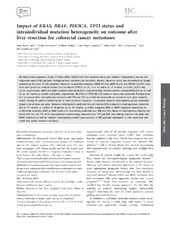| dc.contributor.author | Løes, Inger Marie | en_US |
| dc.contributor.author | Immervoll, Heike | en_US |
| dc.contributor.author | Sorbye, Halfdan | en_US |
| dc.contributor.author | Angelsen, Jon-Helge | en_US |
| dc.contributor.author | Horn, Arild | en_US |
| dc.contributor.author | Knappskog, Stian | en_US |
| dc.contributor.author | Lønning, Per Eystein | en_US |
| dc.date.accessioned | 2017-04-04T13:31:44Z | |
| dc.date.available | 2017-04-04T13:31:44Z | |
| dc.date.issued | 2016-04 | |
| dc.Published | International Journal of Cancer 2016, 139(3):647-656 | eng |
| dc.identifier.issn | 1097-0215 | |
| dc.identifier.uri | https://hdl.handle.net/1956/15668 | |
| dc.description.abstract | We determined prognostic impact of KRAS, BRAF, PIK3CA and TP53 mutation status and mutation heterogeneity among 164 colorectal cancer (CRC) patients undergoing liver resections for metastatic disease. Mutation status was determined by Sanger sequencing of a total of 422 metastatic deposits. In univariate analysis, KRAS (33.5%), BRAF (6.1%) and PIK3CA (13.4%) mutations each predicted reduced median time to relapse (TTR) (7 vs. 22, 3 vs. 16 and 4 vs. 17 months; p < 0.001, 0.002 and 0.023, respectively). KRAS and BRAF mutations also predicted a reduced median disease-specific survival (DSS) (29 vs. 51 and 16 vs. 49 months; p <0.001 and 0.008, respectively). No effect of TP53 (60.4%) mutation status was observed. Postoperative, but not preoperative chemotherapy improved both TTR and DSS (p < 0.001 for both) with no interaction with gene mutation status. Among 94 patients harboring two or more metastatic deposits, 13 revealed mutation heterogeneity across metastatic deposits for at least one gene. Mutation heterogeneity predicted reduced median DSS compared to homogeneous mutations (18 vs. 37 months; p = 0.011 for all genes; 16 vs. 26 months; p < 0.001 analyzing BRAF or KRAS mutations separately). In multivariate analyses, KRAS or BRAF mutations consistently predicted poor TRR and DSS. Mutation heterogeneity robustly predicted DSS but not TTR, while postoperative chemotherapy improved both TTR and DSS. Our findings indicate that BRAF and KRAS mutations as well as mutation heterogeneity predict poor outcome in CRC patients subsequent to liver resections and might help guide treatment decisions. | en_US |
| dc.language.iso | eng | eng |
| dc.publisher | Wiley | eng |
| dc.rights | Attribution CC BY NC ND | eng |
| dc.rights.uri | https://creativecommons.org/licenses/by-nc-nd/4.0/ | eng |
| dc.title | Impact of KRAS, BRAF, PIK3CA, TP53 status and intraindividual mutation heterogeneity on outcome after liver resection for colorectal cancer metastases | en_US |
| dc.type | Peer reviewed | |
| dc.type | Journal article | |
| dc.date.updated | 2016-12-14T09:46:39Z | |
| dc.description.version | publishedVersion | en_US |
| dc.rights.holder | Copyright 2016 the authors | |
| dc.identifier.doi | https://doi.org/10.1002/ijc.30089 | |

